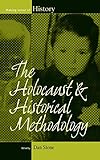The Holocaust and Historical Methodology / ed. by Dan Stone.
Material type: TextSeries: Making Sense of History ; 16Publisher: New York ; Oxford : Berghahn Books, [2012]Copyright date: ©2012Description: 1 online resource (336 p.)Content type:
TextSeries: Making Sense of History ; 16Publisher: New York ; Oxford : Berghahn Books, [2012]Copyright date: ©2012Description: 1 online resource (336 p.)Content type: - 9780857454928
- 9780857454935
- 940.53/18072 23
- D804.348 .H646 2015
- online - DeGruyter
| Item type | Current library | Call number | URL | Status | Notes | Barcode | |
|---|---|---|---|---|---|---|---|
 eBook
eBook
|
Biblioteca "Angelicum" Pont. Univ. S.Tommaso d'Aquino Nuvola online | online - DeGruyter (Browse shelf(Opens below)) | Online access | Not for loan (Accesso limitato) | Accesso per gli utenti autorizzati / Access for authorized users | (dgr)9780857454935 |
Browsing Biblioteca "Angelicum" Pont. Univ. S.Tommaso d'Aquino shelves, Shelving location: Nuvola online Close shelf browser (Hides shelf browser)

|

|

|

|

|

|

|
||
| online - DeGruyter A Lover's Quarrel with the Past : Romance, Representation, Reading / | online - DeGruyter Sharing the ‹i›Sacra‹/i› : The Politics and Pragmatics of Intercommunal Relations around Holy Places / | online - DeGruyter Patients and Agents : Mental Illness, Modernity and Islam in Sylhet, Bangladesh / | online - DeGruyter The Holocaust and Historical Methodology / | online - DeGruyter The Making of the Pentecostal Melodrama : Religion, Media and Gender in Kinshasa / | online - DeGruyter Debating Authenticity : Concepts of Modernity in Anthropological Perspective / | online - DeGruyter Dark Trophies : Hunting and the Enemy Body in Modern War / |
Frontmatter -- Contents -- Preface to the Series -- Introduction: The Holocaust and Historical Methodology -- Part I: Memory and Culture in the Third Reich -- Chapter 1. A World Without Jews: Interpreting the Holocaust -- Chapter 2. Holocaust Historiography and Cultural History -- Chapter 3. The Invisible Crime: Nazi Politics of Memory and Postwar Representation of the Holocaust -- Chapter 4. The History of the Jews in the Ghettos: A Cultural Perspective -- Chapter 5. National Socialism, Holocaust, and Ecology -- Part II: Testimony and Commemoration -- Chapter 6. Bearing Witness: Theological Roots of a New Secular Morality -- Chapter 7. Transcending History? Methodological Problems in Holocaust Testimony -- Chapter 8. Studying the Holocaust: Is History Commemoration? -- Part III: Another Look at a Classic of Holocaust Historiography -- Chapter 9. An Integrated History of the Holocaust: Some Methodological Challenges -- Chapter 10. Truth and Circumstance: What (If Anything) Can Be Properly Said about the Holocaust? -- Chapter 11. Modernist Holocaust Historiography: A Dialogue between Saul Friedländer and Hayden White -- Part IV: The Holocaust in the World -- Chapter 12. The Holocaust and European History -- Chapter 13. Fascism and the Holocaust -- Chapter 14. The Holocaust and World History: Raphael Lemkin and Comparative Methodology -- Select Bibliography -- Contributors -- Index
restricted access online access with authorization star
http://purl.org/coar/access_right/c_16ec
In the last two decades our empirical knowledge of the Holocaust has been vastly expanded. Yet this empirical blossoming has not been accompanied by much theoretical reflection on the historiography. This volume argues that reflection on the historical process of (re)constructing the past is as important for understanding the Holocaust—and, by extension, any past event—as is archival research. It aims to go beyond the dominant paradigm of political history and describe the emergence of methods now being used to reconstruct the past in the context of Holocaust historiography.
Mode of access: Internet via World Wide Web.
In English.
Description based on online resource; title from PDF title page (publisher's Web site, viewed 25. Jun 2024)


